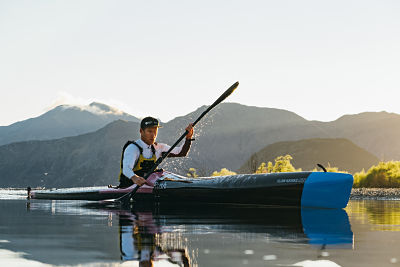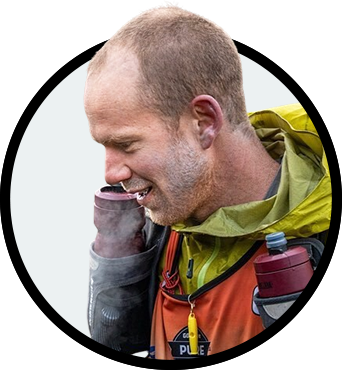My early memories of caffeine transport me back to late 2010, a time when I was courting my now-wife, Amy. She worked as a barista at our local café, and I often found excuses to drop by and strike up conversations with her. At the time, I wasn't a coffee drinker, so I opted for a strawberry milkshake during my visits. Amy was quickly forthcoming in pointing out that if I wanted to impress her, I'd have to change my order…
I reminisce about those early days when I was learning to appreciate coffee, all in the name of love. Interestingly, alongside my efforts to win over the girl of my dreams, I also noticed welcome side-effects during my training sessions, including improved concentration, reduced perceived effort, and often, better overall performance.
As I progressed in both impressing Amy and my training for triathlon and multi-sport, I realised the potential performance benefits of caffeine ingestion. Fast forward to today, and I've become a self-professed coffee ‘addict’...
Trial and error
Initially, I didn't pay much attention to specific recommendations regarding caffeine intake, especially during endurance events. I vaguely recall sporadically consuming caffeinated gels during races, albeit in low doses (around 30-50mg per gel). Looking back, I realise that my approach lacked strategy, and I still encountered significant lows during longer events lasting four hours or more – moments where strategic caffeine intake could have made a positive difference.
Over the course of 14 years of nurturing my coffee obsession in an attempt to impress Amy, I've developed a higher tolerance to caffeine. It's likely that I metabolise it quickly, allowing me to handle higher and more frequent doses.
Additionally, I've come to appreciate the value of a more calculated approach to caffeine intake during endurance events. While I used to "drip-feed" caffeine in smaller doses, I now strategically target key moments in a race to administer higher doses. I will typically aim for 2-3g of caffeine per kilogram of body weight (160-240g total for my former 80kg racing frame).
Additionally, I've learned to moderate my coffee consumption in the days leading up to a big event to alleviate pre-race anxiety, which I've found can be exacerbated by my typical daily caffeine intakes.
Dialling in my strategy
So, how do I approach caffeine consumption around a key endurance event now?
I start the day with a cup or two of strong coffee alongside my pre-race breakfast, providing around 200-300mg of caffeine. For reference, a single espresso has ~63mg of caffeine, and different brews have different strengths. This helps me begin the race with vigor, crucial for establishing a strong position early on.
Considering the half-life of caffeine and my fast metabolism, I plan to consume 2-3mg/kg every 3-4 hours during the race, strategically timing doses to coincide with crucial moments or heightened concentration demands.
For instance, during an IRONMAN I'd consume 2x PF 30 Caffeine Gels at the start of the second 90km lap of the bike leg.
In events like the Coast to Coast World Multisport Championships, I might have those gels around halfway through the mountain run. My rationale for using caffeinated gels (rather than a caffeine tablet or caffeinated drink) was that if I was making the effort to ingest caffeine while racing, why not double up on the return on invested effort by banking 60g of carbohydrate at the same time?

Of course, like any stimulant, there's a risk of ingesting too much caffeine. While some competitors have experienced emergency bowel movements, I've been fortunate to avoid such issues. My highest caffeine intake in one day was around 1,000mg during the Coast to Coast, spread across several doses. While it did affect my ability to fall asleep that night, it was a small price to pay for a successful race.
Carrying caffeinated gels allows me to combat fatigue and maintain focus, which is vital for cohesive teamwork and avoiding mistakes. However, effective communication among teammates is crucial, as I learned during a race in Brazil when we were racing through the night.
I felt the sleepiness kicking in and took a caffeine hit to help overcome it. A few minutes later our team navigator explained he was having trouble concentrating and suggested we all pull over to the side of the road for a two-hour sleep. It’s fair to say I was annoyed at myself as I lay wide awake listening to my three teammates snoring next to me for the next couple of hours! Now, for non-stop expedition adventure races spanning several days with minimal sleep, I adopt a more reactive approach to caffeine intake.
Even in my current role as a cyclor with Emirates Team New Zealand, caffeine remains an integral part of my routine. I start each day of training with a cup of coffee, and before afternoon sessions, I'll have another dose. I’ll then typically avoid caffeine after 3pm in order to safeguard my sleep quality.
For key sessions or fitness tests, I'll consume 200-300mg of caffeine about 30-40 minutes beforehand, confident that it enhances my concentration, output, and perceived effort during high levels of physical exertion.
Yet, beyond the performance benefits, the greatest reward of my journey from strawberry milkshakes to caffeine consumption has been winning Amy's heart. This alone has made every delicious coffee and caffeinated gel I’ve since consumed worth it.
